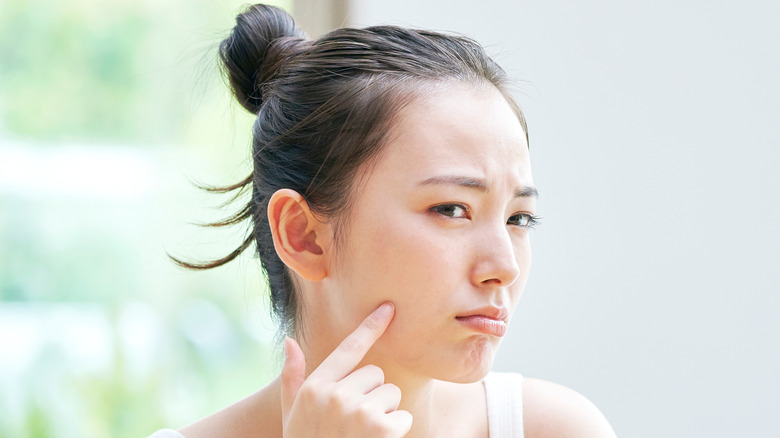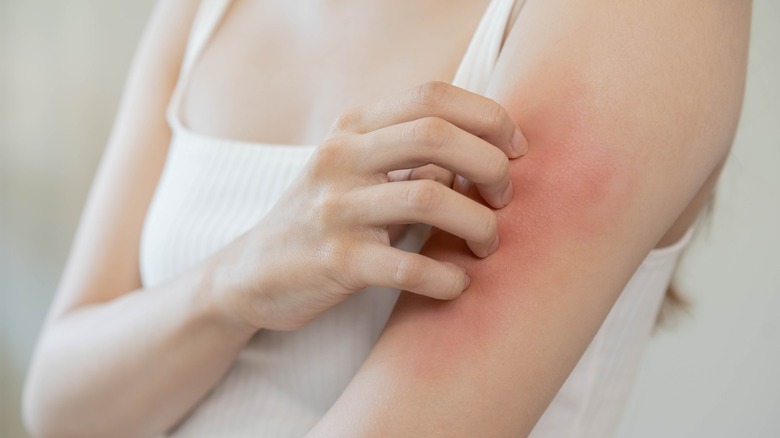Antidepressants Can Have An Unexpected Effect On Your Skin
In a survey by the Centers for Disease Control and Prevention, over 13% of American adults between 2015 and 2018 reported using antidepressant medications within the last 30 days. Antidepressants can relieve depression symptoms and prevent relapses of depressive episodes in some people (per the National Library of Medicine). However, these medications can also be used to treat other conditions, including anxiety and panic disorders, chronic pain, attention deficit hyperactivity disorder (ADHD), and menopause, according to MedicalNewsToday.
There are several different types of antidepressants — from selective serotonin reuptake inhibitors (SSRIs) to the less common monoamine oxidase inhibitor (MAOI) medications — and each works differently in the body. Along with their benefits, there are some common side effects of antidepressants, too. For example, some people experience digestive issues, headaches, sexual dysfunction, dry mouth, or drowsiness when taking antidepressants.
Antidepressants can also have an unexpected impact on the skin. While skin-related side effects may be a burden in some cases, they can also be a pleasant surprise in others.
Possible skin side effects of antidepressants
Antidepressants can be a critical line of defense against depression, but while these medications are known to improve mood, they may cause some unpleasant skin issues. Cosmetic dermatologist Dr. Paul Jarrod Frank explained to Bustle, "[Antidepressants] all come with a potential list of skin manifestations — there is no drug without side effects."
Skin-related side effects can vary depending on the type of medication, as well as the individual. They can also depend on other side effects. For example, dermatologist Dr. Justine Hextall told Refinery29 that dry mouth may coincide with skin dryness, leading to chapped lips and flaky skin. In other cases, antidepressants may cause excessive sweating, which can trigger acne flare-ups.
A 2014 case report published in The Journal of Neuropsychiatry and Clinical Neurosciences also detailed a possible correlation between the SSRI sertraline and acne. Acne is also listed as a rare side effect of escitalopram, another common SSRI (per Drugs.com).
Besides acne spots, a 2014 literature review published in Advances in Dermatology and Allergology noted that antidepressants can trigger skin rashes, blisters, and skin lesions, some of which are related to life-threatening conditions. The review also states that psychotropic drugs are twice as likely to cause skin reactions.
Antidepressants may treat common skin concerns
For pesky acne and other mild skin reactions to antidepressants, the good news is that they are often only temporary. "[W]hen I see people on medications that can activate skin disease or inflammation, it is usually a short-term thing," Cosmetic Dermatologist Dr. Paul Jarrod Frank told Bustle.
Additionally, antidepressants actually improve skin quality for some people without needing to endure adverse reactions first. According to Healthline, mood disorders like depression — along with high stress levels — often go hand in hand with skin troubles such as acne and eczema. Antidepressants may tackle both simultaneously, helping patients feel better both on the inside and the outside. A 2017 report published in the Swedish journal Acta Dermato-Venereologica also suggested that monoaminergic antidepressants have anti-inflammatory effects on the skin. They could be used to treat some common inflammatory skin disorders, including chronic hives, psoriasis, atopic dermatitis, eczema, and alopecia areata.



